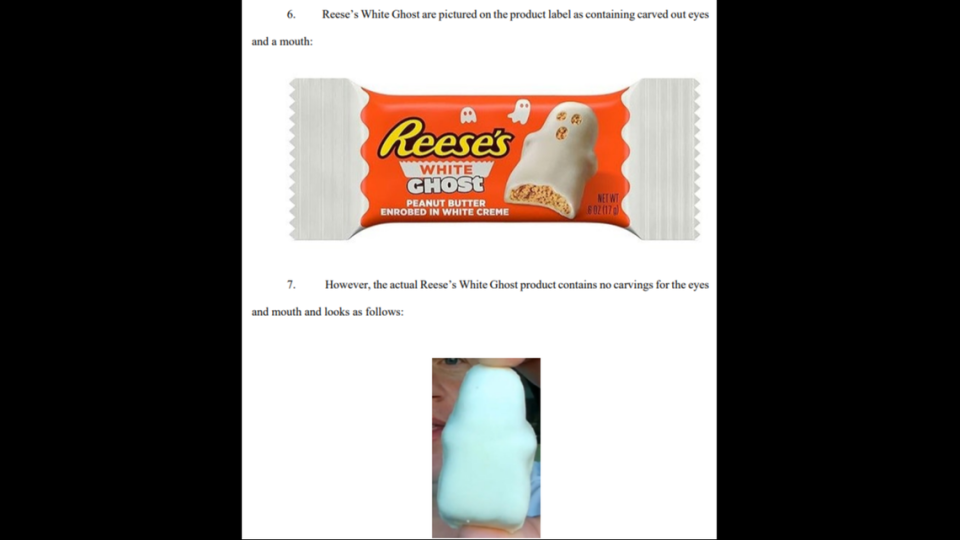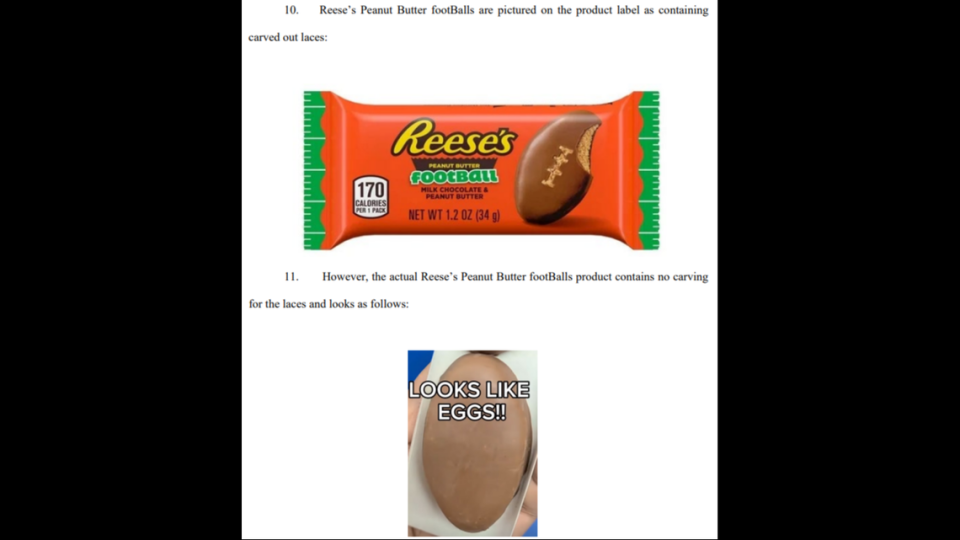Hershey ‘lied’ about its Reese’s holiday-themed candy, lawsuit says. ‘Monstrosity’
Is Hershey deceiving customers with its Reese’s holiday-themed peanut butter candies — as a new class-action lawsuit suggests?
It’s up to a federal court to decide.
Florida resident Cynthia Kelly is suing The Hershey Company for more than $5 million after she bought a bag of Reese’s Peanut Butter Pumpkins for about $4.49 in October.
Kelly thought the chocolates “contained a cute looking carving of a pumpkin’s mouth and eyes as pictured on the product packaging,” but she did not find any “artistic carvings” when she opened the wrappings, according to the suit filed in U.S. District Court for the Middle District of Florida.
If she knew the Reese’s pumpkins had no such carvings, she would’ve never purchased them at her local Aldi’s, a complaint filed Dec. 28 says.
The Hillsborough County woman accuses Hershey of “false and deceptive advertising” in her suit filed on behalf of herself and similarly situated customers, who the complaint says have been “tricked and misled.”
McClatchy News contacted Hershey for comment Dec. 29 and is awaiting a response.
Kelly is represented by Anthony J. Russo, of the Russo Law Firm, who’s represented similar lawsuits against Wendy’s, McDonald’s and Burger King.
“We feel confident when we file these cases that they have the merits … otherwise we wouldn’t move forward with them,” Russo told McClatchy News on Dec. 29.
Lawyer Adam R. Fox, a partner at Squire Patton Boggs law firm, who doesn’t represent the lawsuit, told McClatchy News on Dec. 29 these cases have “become rather commonplace.”
“Rather than seeking to vindicate important rights that have been violated, the suit simply seizes on whimsical marketing during a holiday season and attempts to leverage one wooden interpretation of it for mercurial gain,” said Fox, who leads his firm’s false and misleading advertising litigation and protection team.
‘We got lied to’
According to the lawsuit, a few YouTube content creators have voiced similar complaints in online videos about the lack of carvings on Reese’s candies, including one YouTuber who was “flabbergasted.”
“Reese’s what are you doing! Look at the picture on the packet. It’s like a pumpkin with faces and a little mouth — then you open up the packet and you are presented with that monstrosity,” one YouTuber said.
“We got lied to,” another YouTuber said in a separate video review after he opened a Reese’s peanut butter white ghost candy.
He discovered the ghost eyes seen on the candy’s label weren’t carved into the chocolate, the complaint says.

In addition to Reese’s Halloween candy, Reese’s assorted snowmen, stockings and bells holiday candies — as well as its peanut butter footballs — don’t have carved designs as seen on packaging, according to the suit.

According to Fox, the way Hershey advertises its holiday candies are “fun, not false.”
Does the lawsuit have a chance?
When asked what it may take for the lawsuit to succeed, Fox told McClatchy News three issues must be proven before the court.
He said there needs to be “proof that the whimsical images on the packages were material to purchasing decisions of a substantial segment of consumers, a demonstration that the consumers universally share a view of the advertising that warrants class certification despite the ordinary rule that lawsuits proceed on behalf of names parties only, and a demonstration of damages class-wide that can withstand scrutiny.”
When asked if he believes Kelly’s lawsuit is likely to succeed, Fox said it depends.
“If success is having a class certified and money returned to millions of consumers even though they got exactly what they paid for, this result is incredibly unlikely, approaching zero,” Fox said.
“If success is obtaining a nuisance settlement for a single plaintiff because the defendant thinks that result is more economical than spending the money on early motion practice to dispose of the case, that result will depend upon the defendant’s taste for making a point,” he added.
Russo told McClatchy News that his firm doesn’t file these types of lawsuits often.
“When we do, we feel they have strong merits,” Russo said.
Russo previously represented a federal lawsuit filed against Wendy’s and McDonald’s that accused the companies of false and misleading advertising when it came to the size of their burgers.
On Sept. 30, a federal judge in New York dismissed the lawsuit. The court ruled the fast food chains’ advertising did not violate business law as alleged, McClatchy News reported.
Russo said he was disappointed with the outcome of that case. However, he hopes a judge in Miami will allow his firm’s ongoing lawsuit against Burger King to proceed.
In August, Judge Roy Altman denied Burger King’s motion to dismiss the lawsuit, which accuses the company of misleading customers by how it advertises the size of its Whoppers, Reuters reported.
“He felt the case had a lot of merit,” Russo said.
Burger King has since filed another motion to dismiss the lawsuit, according to Russo. Now, Altman is to decide whether to deny or grant Burger King’s new motion to dismiss the case.
“We’re really trying to keep the big companies honest in their advertising,” Russo said of these lawsuits.
Kelly’s lawsuit over the Reese’s candies demands a trial by jury.
When it comes to lawsuits like hers, Fox told McClatchy News that he feels it wastes the court’s time.
“In my view, suits like this start out as a failure in our system, wasting the time of the judiciary at taxpayer expense and driving up costs of consumer products for everyone because of misguided avarice,” Fox said.
Judge makes ruling in suit accusing McDonald’s, Wendy’s of deceptive burger advertising
Court dismisses lawsuit filed over Texas Pete hot sauce being made in North Carolina
Man sues Kraft Heinz over its lemonade mix — calling it ‘misleading’ and deceptive

